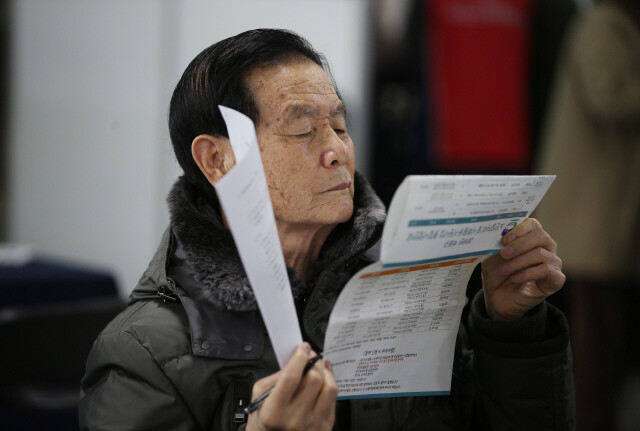hankyoreh
Links to other country sites 다른 나라 사이트 링크
South Korea’s elderly income inequality highest in OECD

Income inequality among elderly South Korean is the highest in the OECD, a new study shows.
The problem stems from the fact that four out of ten elderly workers earn below the minimum wage or otherwise suffer from severe poverty. There are now growing calls for measures to reduce senior poverty through better jobs and income preservation.
A report titled "Employment Structure Changes and Income Inequality among the Elderly Demographic" published on Sep. 11 by the Korea Labor Institute (KLI) reported South Korea's Gini coefficient level for seniors over 65 at 0.422 for disposable income as of 2013, placing it together with Chile (0.428) among the highest-scoring countries. The Gini coefficient is an indicator of the degree of inequality in a country's income distribution, with values closer to one indicating greater inequality. In contrast, the Gini coefficient for South Korea's working-age population aged 18 to 65 stood at 0.28, a lower level than in OECD member countries like the US (0.392), the UK (0.353), Germany (0.299), and France (0.294).
The severity of income equality among elderly South Koreans is seen as stemming from conditions in which the pension system is not yet firmly established, resulting in a large number of working seniors -- many of whom earn low wages. The 2015 employment rate for those aged 60 and older was 38.9%. In the case of those aged 60 to 64, the rate was 59.4%, or six percentage points higher than ten years before.
At issue is the fact that one out of every two working seniors is suffering from low wages, with hourly pay less than two-thirds of the median. A total of 56.5% elderly workers are classified as low-wage, with 37.1% earning below minimum wage -- rates two to three times higher than the respective percentages of 21.4% and 11.6% for all workers. Among elderly female workers in particular, over seven out of ten (71.6%) earn low wages, while nearly half (46.6%) make less than minimum wage.
The situation is one in which seniors who do find work are faced with low-quality jobs that leave them stuck in the poverty class. The relative poverty rate for elderly South Korean -- representing the percentage making less than 50% of the median income -- was found to be relatively high 47.6%, with 35% of them employed.
"Most of the seniors who lacked systematic preparations for their post-retirement livelihood are choosing -- either voluntarily or as an unavoidable means to sustain their livelihood -- to remain in the labor market, even if the jobs are of low quality," the report said.
"We need to make high-quality jobs available to seniors and consider income preservation policies to alleviate income inequality," it advised.
By Jeong Eun-joo, staff reporter
Please direct questions or comments to [english@hani.co.kr]

Editorial・opinion
![[Guest essay] Amending the Constitution is Yoon’s key to leaving office in public’s good graces [Guest essay] Amending the Constitution is Yoon’s key to leaving office in public’s good graces](https://flexible.img.hani.co.kr/flexible/normal/500/300/imgdb/original/2024/0416/8917132552387962.jpg) [Guest essay] Amending the Constitution is Yoon’s key to leaving office in public’s good graces
[Guest essay] Amending the Constitution is Yoon’s key to leaving office in public’s good graces![[Editorial] 10 years on, lessons of Sewol tragedy must never be forgotten [Editorial] 10 years on, lessons of Sewol tragedy must never be forgotten](https://flexible.img.hani.co.kr/flexible/normal/500/300/imgdb/original/2024/0416/8317132536568958.jpg) [Editorial] 10 years on, lessons of Sewol tragedy must never be forgotten
[Editorial] 10 years on, lessons of Sewol tragedy must never be forgotten- [Column] A death blow to Korea’s prosecutor politics
- [Correspondent’s column] The US and the end of Japanese pacifism
- [Guest essay] How Korea turned its trainee doctors into monsters
- [Guest essay] As someone who helped forge Seoul-Moscow ties, their status today troubles me
- [Editorial] Koreans sent a loud and clear message to Yoon
- [Column] In Korea’s midterm elections, it’s time for accountability
- [Guest essay] At only 26, I’ve seen 4 wars in my home of Gaza
- [Column] Syngman Rhee’s bloody legacy in Jeju
Most viewed articles
- 1[Guest essay] How Korea turned its trainee doctors into monsters
- 2[Column] A death blow to Korea’s prosecutor politics
- 3[News analysis] Watershed augmentation of US-Japan alliance to put Korea’s diplomacy to the test
- 4‘National emergency’: Why Korean voters handed 192 seats to opposition parties
- 5[Photo] Cho Kuk and company march on prosecutors’ office for probe into first lady
- 6Exchange rate, oil prices, inflation: Can Korea overcome an economic triple whammy?
- 7After Iran’s attack, can the US stop Israel from starting a regional war?
- 8US grants Samsung up to $6.4B in subsidies for its chip investments there
- 9[Guest essay] Amending the Constitution is Yoon’s key to leaving office in public’s good graces
- 10Student made first call for rescue from sinking Sewol ferry